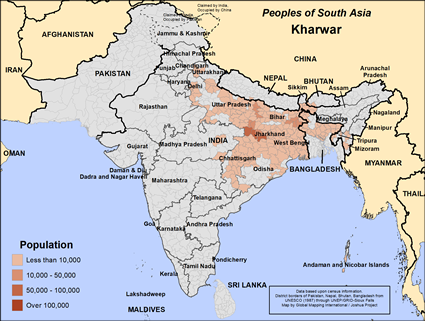Kharwar in India

Photo Source:
Anonymous
|

Map Source:
People Group data: Omid. Map geography: UNESCO / GMI. Map Design: Joshua Project.
|
| People Name: | Kharwar |
| Country: | India |
| 10/40 Window: | Yes |
| Population: | 576,000 |
| World Population: | 596,000 |
| Primary Language: | Hindi |
| Primary Religion: | Hinduism |
| Christian Adherents: | 0.15 % |
| Evangelicals: | 0.00 % |
| Scripture: | Complete Bible |
| Ministry Resources: | Yes |
| Jesus Film: | Yes |
| Audio Recordings: | Yes |
| People Cluster: | South Asia Tribal - other |
| Affinity Bloc: | South Asian Peoples |
| Progress Level: |
|
Introduction / History
Kharwar is a caste name found in the states of Assam, Jharkhand, Madhya Pradesh, Chhattisgarh, Uttar Pradesh, Bihar, West Bengal, Maharashtra and Odisha.
What Are Their Lives Like?
Kharwar's primary traditional economic activity has been agriculture. Due to their dependence on the same annual crop and suitable weather they engage in work based on forest activities, livestock, fishing, hunting and nets to sustain themselves. Kharwar of Assam works in farming as well as tea leaf making of Assam.
What Are Their Beliefs?
Kharwar believe their origin came from Rohitashva, son of Suryavanshi king Harishchandra. Rohitashva was expelled from the country due to the curse. They came to the forest and the help cell of the forest dwellers; they established their kingdom. During this time, he established a married woman with the forest dweller and the child born from her, the tradition of Kharwar dynasty started.
According to another belief, Kharwar people believe they came from the sun. Due to the coincidence of Lord Surya and Lakshmi daughter Sara, a boy named Bhujbal and a girl named Jaghram were born. This Bhujbal was the adipurush of the Kharwars.
What Are Their Needs?
The Kharwar people need good, drinkable water for themselves and their livestock.
Prayer Points
Pray for loving and dedicated workers to go to the Kharwar people.
Pray for the Holy Spirit to move mightily among the Kharwar people, leading them to put their faith in Jesus Christ.
Pray for Kharwar disciples to make more disciples.